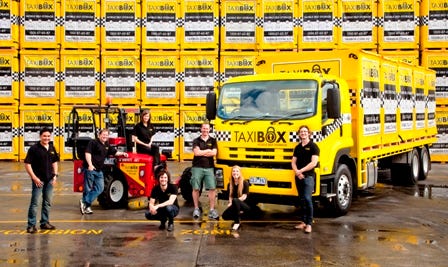Australia's mobile-storage industry is on the fast track for growth, with more companies entering the market and vying for customers. This article offers a snapshot of the thriving business, highlighting the companies in operation and making predictions for the industry's future.
November 28, 2017
By Molly Wiley
Mobile storage has evolved rapidly in Australia. Since the first operators launched approximately seven years ago, we've seen the introduction of PODS (Portable on Demand Storage) as well as a bunch of new operators who seem to offer more of a drop-box model.
There are about 15 companies operating nationally, predominantly in Melbourne and Sydney. Four of them - Gobox, PODS, Smartbox Australia and TaxiBox - have expanded to multiple cities. There's been a ramp-up of entrants in the last three years, with new operators in Adelaide, Brisbane and, recently, Perth.
The Australian mobile-storage business is split into two main models. In the drop-box model, the storage unit is dropped at the customer's location, where it is packed at his leisure. Delivery methods include truck/modular delivery, trailer delivery and container drop-offs.
In the removalist model, which functions similarly to a U.S. moving company, the module-delivery service has been integrated into the existing removals business. Delivery is normally done by a removalist truck with modules on it or containers left on the back of trucks. This model has been around for years, but only recently has it been referred to as a mobile self-storage service.
The majority of these businesses follow a company ownership structure, with a few operators following a franchise-type model. It appears the large success enjoyed by U.S. mobile-storage franchisers is yet to reach the Australian market. This may be due to the country's population or market size and the associated limitations in creating viable franchisee regions. Perhaps mobile storage hasn't thoroughly penetrated the market yet.
Click here for an overview of Australia mobile-storage operators.

Growth
Accompanying the growth of mobile storage in Australia is the emergence of interstate (long-distance) moving. Some operators, including PODS and TaxiBox, offer a direct interstate-delivery service. Although this market is in its infancy, it is growing fast and will continue to do so, as there are distinct advantages to this hassle-free, cost-effective service.
A 2012 report produced by the Self-Storage Association of Australasia revealed that, overall, self-storage facilities had been experiencing flat growth over the previous few years. While it's not widely documented, mobile storage seems to have enjoyed significant growth over the same period. Questions arise as to whether mobile is cannibalizing traditional self-storage or if these truly are flat times in the industry as a whole.
Another explanation might be the way consumers use mobile vs. traditional self-storage. For example, mobile storage caters to a more residential customer base, whereas commercial tenants comprise as much as 30 percent of a self-storage facility's clientele. This demographic, combined with a strong softening in overall business sentiment, may be contributing to the slowdown in traditional storage growth.
Looking Ahead
The outlook for the Australian mobile-storage industry remains positive, although further competition is beginning to squeeze margins for some facilities. We have yet to see the emergence of a clear leader in the industry, and this space is still to be explored. That said, some operators have begun to make headway toward the top of this growing niche.
Molly Wiley is the marketing manager for TaxiBox, a mobile storage company with locations in Melbourne and Sydney, Australia. For more information, visit www.taxibox.com.au.
You May Also Like





